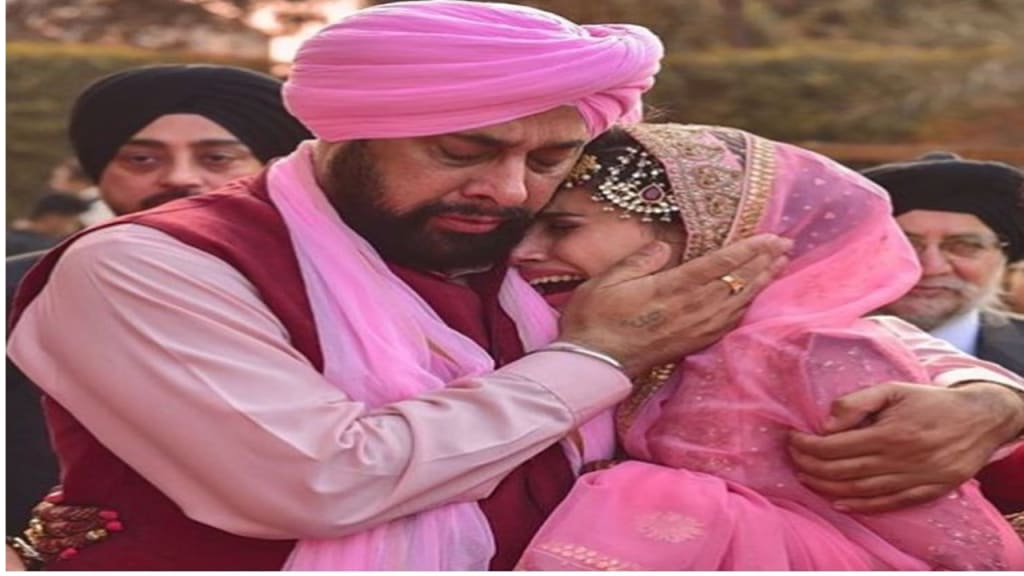Pica: The Revered Abode and Belongings of the Bride's Father in Punjabi Society
Importance of Father in Punjabi House

In Punjabi society, the father holds a significant position as the soul of the family, and his abode, known as Pica, carries immense importance. Pica represents the ancestral home of the bride's father and embodies the heritage, values, and pride of the Matiar (Young Girl) in Punjab. This essay explores the cultural significance of Pica, shedding light on its role as a symbol of tradition, honor, and familial identity.
Pica is the ancestral home of the bride's father, representing the historical and cultural legacy of the Matiar. It is considered a sacred space where generations of the family have lived and shared their lives. Pica is regarded as the custodian of tradition, preserving the customs and rituals that define Punjabi society.
Architecturally, Pica typically boasts distinct elements that reflect the region's rich cultural heritage. Traditional designs incorporate ornate carvings, intricate frescoes, and colorful motifs, showcasing the artistic prowess of Punjab. The layout often includes a central courtyard, which serves as a communal space for family gatherings and celebrations.
Possessing a grand Pica is a matter of pride for the Matiar, symbolizing their social standing and affluence. The size, design, and opulence of Pica are often seen as a reflection of the family's success and prominence in the community. It serves as a testament to the father's ability to provide a prosperous and secure environment for his family.
In Punjabi culture, the father holds a central position and is considered the pillar of the family. He is revered as the authority figure, responsible for the well-being and guidance of his children. The father's wisdom, integrity, and achievements significantly influence the family's reputation and honor.
Desan De Raja, translated as "King of the Des," refers to the esteemed position of the bride's father within the extended family. The title signifies the father's role as the head of the clan and the guardian of its traditions and values. Desan De Raja is held in high regard, embodying qualities such as leadership, wisdom, and protection.
Pica stands as a testament to the father's legacy, reflecting his dedication to preserving the family's heritage and values. It showcases the father's ability to provide a nurturing environment for his children and uphold the honor of the clan. The grandeur and splendor of Pica become synonymous with the reputation and esteem of Desan De Raja.
Matiar, the extended family, finds its collective identity and unity through their association with Desan De Raja's Pica. Pica acts as a common thread that connects family members, strengthening their bond and shared sense of pride.
Pica serves as the backdrop for numerous family rituals, ceremonies, and celebrations. It is in Pica that important life events are celebrated, such as weddings, births, and religious ceremonies. The house becomes a hub of activity, filled with joy, laughter, and the aroma of delicious Punjabi cuisine. These celebrations not only reinforce the cultural heritage but also strengthen the familial ties and create lasting memories.
The belongings within Pica hold immense sentimental value for the family. Heirlooms, antiques, and artifacts passed down through generations serve as reminders of the family's history and ancestral roots. These cherished possessions are not merely objects but symbols of lineage, carrying stories and memories that connect the past with the present.
Pica is not only a physical space but also a repository of knowledge and wisdom. It is within these walls that traditions, customs, and family values are imparted from one generation to the next. The father, as the head of the family, plays a vital role in passing down this cultural heritage to his children, ensuring its continuity and preservation.
In conclusion, Pica holds great significance in Punjabi society as the revered abode and belongings of the bride's father. It represents the embodiment of tradition, honor, and familial identity. Pica stands as a testament to the father's role as Desan De Raja, the revered leader of the extended family. It serves as a symbol of prestige and social standing while fostering a collective sense of pride and unity within the Matiar. Through Pica, the family's cultural heritage is preserved, celebrated, and passed on to future generations, ensuring the continuity of Punjabi traditions and values.
About the Creator
Dr. Amjad Ali Bhatti
Dr. Amjad Ali Bhatti is a multifaceted individual who has made significant contributions in the fields of research, translation, literature, and social activism.






Comments
There are no comments for this story
Be the first to respond and start the conversation.